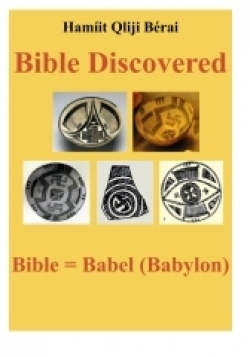Bible Discovered
Bible = Babel (Babylon)
“When the legend becomes fact, print the legend,” is what a newspaper editor tells a young reporter in the classic John Ford western The Man Who Shot Liberty Valence. That is what generations of archaeologists, anthropologists, etymologists, and linguists have done in their reports on the language, culture, and history of the Kurdish people, according to author Hamíit Oliji Bérai in Bible Discovered.
Kurdistan “was in ancient past the birthplace of civilization and culture heritage of the human race” and its people were “the inventors of the wheel, the discoverers of script, the homeland of the empires, the forefathers of the world religions (polytheism the matriarchal culture; monotheism the patriarchal culture), the source of inspiration of western civilization, in other words, the mother of all cultures.” Those accomplishments, claims Bérai, have been mistakenly, or even intentionally, attributed to other ethnic and cultural groups.
Bible Discovered is meant for serious students of Biblical archaeology or interested amateurs seeking to broaden their understanding of the language, culture, and accomplishments of the ancient peoples of what Herodotus dubbed “Mesopotamia,” the land between the rivers.
The Kurds, whom Bérai says have inhabited that area continuously since before history was recorded, call this place Botania, or Jzira Botan, the “island” between the Tigris and the Euphrates. “Unfortunately, modern scholars,” he charges, “do not count Kurds and Kurdish in their work at all, they unfairly wipe away [the] name of the Kurds and replaced it unjustly with Turkish, Arabic, Iranian, Persian or Mesopotamian.”
Bérai backs up his thesis of what he calls a “fabrication” of history with hundreds of examples, including maps, photographs of archaeological sites, illustrations, and extensive translations of pictographs taken from steles, bowls, daggers, tablets, and other artifacts. His translation, reasoning, and conclusion will surely raise the eyebrows of traditional scholars, as Bérai challenges what two centuries of (mostly European) experts have published and still teach.
Bérai makes no attempt to hide his own Kurdish bias. He believes that imperial powers—and Turks and Iranians in particular—“have falsified Kurdish history and historical documents” for their own national goals. It is this “fabrication” Bérai hopes to expose.
He also makes what some might consider an overreaching claim that Abraham and Noah and their sons are of Kurdish heritage, and that the name Hebrew, as well as the Hebrew language, is of Kurdish origin.
Those with a genuine interest and solid background in the archaeological, anthropological, cultural, and linguistic study of the ancient Near East will find Bible Discovered a fascinating, if controversial, counterclaim to accepted doctrine. At the very least, Bérai presents a wealth of information for readers to examine. However, Bérai’s writing is sometimes dense, even for those familiar with the study of ancient languages and cultures. The book’s occasional lapses in grammar, owing to the author writing outside of his native language, also undermine its readability.
Unlike the newspaper editor in The Man Who Shot Liberty Valence, Bérai believes that, “when the facts contradict your theory, you should modify your theory, not the facts.”
Reviewed by
Mark G. McLaughlin
Disclosure: This article is not an endorsement, but a review. The publisher of this book provided free copies of the book and paid a small fee to have their book reviewed by a professional reviewer. Foreword Reviews and Clarion Reviews make no guarantee that the publisher will receive a positive review. Foreword Magazine, Inc. is disclosing this in accordance with the Federal Trade Commission’s 16 CFR, Part 255.

